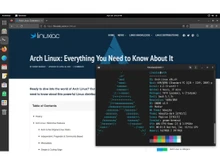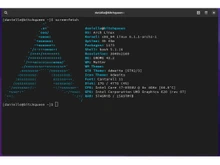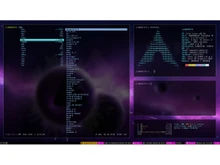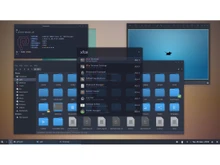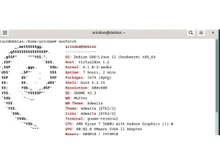Arch Linux and Debian are two popular Linux distributions known for their distinct characteristics. While both offer powerful and flexible solutions, they cater to different user preferences and technical requirements. Arch Linux works on a very minimalist and do-it-yourself approach. In contrast, Debian emphasizes stability and reliability, employing a release-based model with comprehensive testing processes. This quick comparison between Linux and Debian will highlight key differences in installation, package management, system configuration, user base, and more.
Arch vs. Debian: An Overview
Arch Linux is a lightweight Linux distribution known for its simplicity, customizability, and rolling release model. It is designed for users who prefer a do-it-yourself approach and a system customized to all their requirements. The Arch User Repository (AUR) provides a vast collection of user-contributed packages, expanding the distribution software’s offerings.
On the other hand, Debian is a stable and versatile Operating System recognized for its commitment to free and open-source software. Apart from that, it offers an extensive package repository and stringent testing processes. Moreover, it appeals to a diverse user base, ranging from beginners to advanced users, due to its reliability, user-friendliness, and broad hardware support.
Arch Linux vs. Debian: Key Differences
Here are the key differences between Arch Linux and Debian presented in the pointers below:
- Debian emphasizes stability, reliability, and extensive testing. On the other hand, Arch Linux and other Arch alternatives emphasize a minimalistic and lightweight distribution approach.
- Arch Linux follows a rolling release model with continuous updates. While Debian follows a stable release model with long development cycles.
- Debian and similar Debian alternatives offer various installation options, including a graphical installer. Arch Linux, on the other hand, offers a manual configuration that allows for extensive customization.
- Arch Linux is designed for users who prefer a do-it-yourself approach. Whereas, Debian has been designed for a wide range of users, from beginners to professionals.
- Debian utilizes the Advanced Package Tool (APT) for package management and maintaining a central repository of precompiled software packages. Arch Linux, on the other hand, offers Pacman package manager and Arch User Repository (AUR) to ensure software management and extensive package options.
Arch and Debian: In Terms of Features
Here are the key differences between Arch and Debian based on distinct features like installation, package management, system configuration, and more.
- Package Management: Arch Linux uses Pacman package manager, known for its simplicity, speed, and extensive support for the Arch User Repository (AUR). Debian, on the other hand, uses the Advanced Package Tool (APT), a feature-rich package management system.
- Installation: Arch offers a minimalistic installation process, which allows users to manually configure their systems but demands more technical proficiency. While Debian offers a variety of installation options, including a graphical installer, which makes it more accessible for beginners. It also provides a range of pre-configured options for easy setup.
- Customization: Arch Linux offers the best customization options, with its minimalist installation and DIY philosophy allowing users to customize their systems according to their needs. Debian also offers customization options, but its emphasis on stability makes it relatively less customizable compared to Arch Linux.
- Package Repositories: Arch Linux's official software repositories primarily focus on providing cutting-edge software, while the AUR offers a rich source of community-contributed packages. However, Debian is a vast, well-maintained central repository with thousands of precompiled software packages.
- System Configuration: Arch Linux provides a high degree of customization right from the installation process, allowing users to customize their systems as per their system requirements. Debian, on the other hand, offers various installation options and a range of pre-configured system setups, providing flexibility.
Arch vs. Debian: Ease of Use
Arch Linux is known for its "simple" approach but is a bit complicated to set up initially. It's generally favored by users who prefer to have full control over their systems. On the other hand, Debian has a user-friendly installation option and is considered more approachable for beginners. Its stable and reliable nature appeals to a wide range of users, from beginners to seasoned professionals.
Arch or Debian: Release Model
Arch Linux follows a rolling release model, providing continuous updates and the latest software versions. While Debian follows a stable release model with long development cycles, emphasizing thorough testing for stability and reliability before new versions are released.
Arch Linux or Debian: User Base
Arch Linux generally targets users with a preference for minimalism, a DIY approach, and a desire for full system control. Its community also emphasizes self-reliance. In contrast, Debian accommodates a diverse user base, including both beginners and advanced users, with its focus on stability and broad hardware support.
Arch vs. Debian: Security
Both Arch Linux and Debian prioritize security, with regular updates and strong security measures. However, Debian is known for its rigorous testing processes, while Arch Linux's rolling release model ensures frequent security updates.
Arch or Debian: Updates
Arch Linux emphasizes frequent updates, being a rolling release distribution, providing users with the latest software releases and security patches as soon as they become available. On the other hand, Debian's stable release model ensures that updates go through rigorous testing, providing a balance between stability and updated software.
Arch and Debian: System Requirements
Arch Linux has lower system requirements due to its minimalist nature, making it well-suited for running on older hardware or a lightweight system. On the contrary, Debian offers support for a wide range of hardware configurations while maintaining stable performance.
Arch or Debian: Target Audience
Arch Linux has been designed to target more experienced users who prefer to have full control over their system and are comfortable with manual configuration and maintenance. While Debian accommodates a broader user base, including both beginners and advanced users, with its focus on stability and a wide range of supported hardware architectures.
Verdict: Arch vs. Debian
In conclusion, Arch Linux and Debian represent two distinct approaches to Linux distributions. Arch, on the one hand, caters to experienced users seeking a lightweight, customizable system with its rolling release model and emphasis on minimalism. On the other hand, Debian prioritizes stability, reliability, and user-friendliness, making it suitable for a broader user base, including beginners. Both distributions have robust package management systems and extensive community support, but their primary difference lies in their release models, installation processes, and the target user preferences.


 3 Ratings & 0 Reviews
3 Ratings & 0 Reviews




